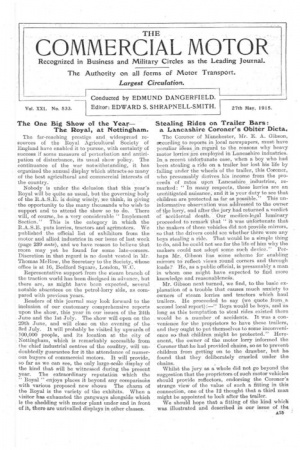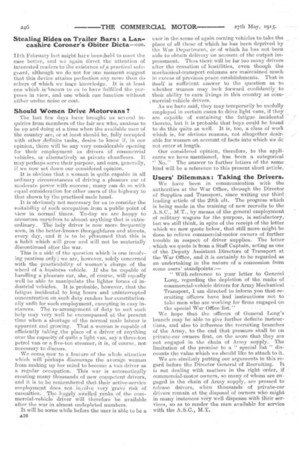COMMER FH I E AL MOTOR
Page 1

Page 2

If you've noticed an error in this article please click here to report it so we can fix it.
Recognized in Business and Military Circles as the Leading Journal.
The Authority on all forms of Motor Transport. Largest Circulation.
Conducted by EDMUND DANGERFIELD. Editor: EDWARD S. SHRAPNELL-SMITH.
The One Big Show of the Year— The Royal, at Nottingham.
The far-reaching prestige and . widespread resources of the Royal Agricultural Society of England have enabled it to pursue, with certainty of success if some measure of perturbation and anticipation of disturbance, its usual show policy. The .continuance of the war notwithstanding, it has organized the annual display which attracts-so many of the best agricultural and commercial interests of the country.
Nobody. is under the +delusion that this year's Royal will be quite. as usual, but the governing body of the R.A.S.E. is doing wisely i' we think, in giving the opportunity to the many thousands who wish-to support and to attend the show so to do.. There will, of course>, be a very considerable " Implement Section." This is the category in which the R.A.S.E. puts lorries, tractors and agrimotors. We published the official list of exhibitors from the motor and allied industries in our issue of last week (page 239 ante), and we have reason to believe that room may yet be found for some late-comers. Discretion in that regard is no doubt vested in Mr. Thomas Mellow, the Secretary to the Society, *hose office is at 16, Bedford Square, London, W.C.
Representative support from the steam branch of the traction world has been disclosed in advance, but there are, as might have bean expected, several notable absentees on the petrol-lorry side, as compared with previous years.
Readers of this journal may look forward to the inclusion of our customary comprehensive reports upon the show, this year in our issues of the 24th June and the 1st July. The show. will open on the . 29th June, and will close on the evening of the . 3rd July. It will probably be visited by upwards of . 100,000 people, and its location at the city of • Nottingham, which is remarkably accessible. from the •chief industrial centres of the country, will undoubtedly guarantee for it the attendance of numerous buyers of commercial motors. It will provide, so far as we can see, the only large-scale display of the kind that will be witnessed during the present year. The extraordinary reputation which the " Royal "enjoys places it beyond any comparisons with various proposed new shows The charm of the Royal is the variety of the exhibits. When a visitor has exhausted the gangways alongside which is the shedding with motor plant under and in front of it, there are unrivalled displays in other classes.
Stealing Rides on Trailer Bars: a Lancashire Coroner's ()biter Dicta.
The Coroner of Manchester, Mr. E. A. Gibson, ar cording to reports in local newspapers, must have peculiar idea.s in:regard to the reasons why heavy motor lorries ,are.eniplOyed in Lancashire industries. In a recent Unfortunate case, when a boy who had been stealing a ride on a trailer bar lost his life by • f ailing under the wheels of the trailer, this Coroner, who presumably derives his income from the pro, ceeds of rates' upon 'Lancashire _ industries, remarked: " In many respects, these lorries are an unthitigated nuisance; and it is yourduty to see that children are 'protected as far as possible." This uninformative observation was addressed to the owner of the lorry*, and after the jury had returned a verdict of accidental death. Our medico-legal luminary proceeded to remark that " it was. unfortunate that the makers of these vehicles did not provide mirrors, so that the drivers could see whether there were any boys stealing a ride. That would. be a simple thing to do, and he could not see for the life of him why the makers could not adopt some such device." Perhaps Mr... Gibson' has some scheme for enabling mirrors to reflect views round corners and through loads? He, as a public official, is presumably a man in whom one might have expected to find more knowledge and. reasonablends. Mr. Gibson next turned, we find, to the basic explanation of a trouble that causes much anxiety to owners of steam lorries and tractors which haul trailers. He .proceeded to say (we quote. from ..a second local report) Boys would be boys; and as long as this temptation to steal rides existed there would be a number, of accidents. It was a convenience for the praprietors to have these trailers, • and they ought to put themselves to some inconvenience so that children might be protected." Hereanent, the miner of the motor lorry informed the 'Coroner that he had provided chains, so as to prevent children from getting on to the drawbar, but he found that. they deliberately crawled under the chains.. Whilst the jury as a whole did not go beyond the suggestion that the proprietors of such motor vehicles should provide reflectors, endorsing the Coroner's strange view of the value of such a fitting in this connection, one of the 12 thought that a third man might be appointed to look after the trailer. We should hope that a fitting of tlio kind which was illustrated and described in our issue of the Stealing Rides on Trailer Bars: a Lan-, ca.shire Coroner's °biter Dicta—con.
11th February last might hate beentheld. to meet the case better, and we again. direct the attention of interested readers tOthe existence of,a practical safeguard, although we do, not for one moment suggest that this device attains perfection any more than do others of which, we have knowledge. It is at least one which is-known to us to have fulfiffid the purposes in view, and one which can function without either undue noise or cost.
Should Women Drive Motorvans ?
'The last few days have brought us several inquiries from Members of the lair sex who, anxious to be up and doing at a time when the available men of the country are,. or at least should be, fully occupied with other .deffinte tasks, desire to know if, in our opinion, there will be any very considerable opening for their employment as drivers Of commercial %ehicles, or alternatively as private chauffeurs. It may perhaps serve their purpose, and ours, generally,' if we now set down our considered opinion.
It is obviOns that a woman is quite capable in all ordinary circumstances of driving a pleasure car of moderate poWer with success; many can do so with equal consideration for other users of the highway to that shown by' the practised male hand.
It is obviously not necessary for us to consider the suitability of such:occupation from a public point of view in normal' times.. 10 daywe are happy to accustom ourelves to almost anything that is extraordinary. 'The' lady driver is now more frequently seen, in the hatter-known thoroughfares and streets, every day,. and it is to be pt'sumed that this is a habit whieh will grow and will not be materially discontinued after the war.
This is a siddof the question which is one involving pastime prily: we are, however, solely concerned with the Practicability of woman's charge. of the wheel of a bUsiness vehicle. If she be capable_ of handling a,' pl6as'ure car, she, of course, will equally well be able to manipulate the lighter forms of industrial vehicles... It is probable, however, that the fatigue incidental. to long hours and uninterrupted concentrationrensuch duty renders her constitution • ally unfit for such ,employment, excepting in easy instances. The:re-arrangement of duty to suit such help may very Well be encompassed at the presnt time when a shortage of the normal male labour is apparent and growing. Thata woman' is capable of efficiently taking, the place of a driver_ of anything over the capacity ,of quite a light van, say a. three-ton petrol van or a five-ton steamer, it is, of .course, not necessary to discuss. .
We come, now to a feature of the whole situation which will -Perhaps diseourage the aver,6.ge woman from making up her mind to became a van-driver as a regular 'occupation. This war is automatically creating many thousands of new competent drivers, and it is to. berernembered that. their -active-service employment does. not....itkv.o.Ne, .vely grave nsk of casualties, . The hugely..sWelled ranks of the cornmercial-vehicle driver will therefore be available after the war in almost undepleted numbers.
It will be some while befOre the user is able to be a A1.6 user in the sense of again owningvehicles to take the place of all those of which he has been deprived by the War Department, Cr of which he has not been able to obtain delivery On account of the output impressment. Thus there will be far too many drivers after the 'cessation of hostilities, even though the mechanical-transport columns are maintained much in excess Of previous peace 'establishments. That in itself is sufficient answer to the question as to whether *omen may look forward confidently. to their ability to earn livings in this country as commercial-vehicle drivers.
As we have said, they may temporarily be usefully employed in certain cases to drive light van,' if they• are capable of silstaining the fatigue. incidental thereto, but it is probable that boys could be found to do this quite as well. It is, too, a class of work which is, for obvious reasons, not altogether desir, able for women an at-Taunt of facts into; which We de not enter at length.
Our considered opinion, therefore,.. to the applicants we have mentioned, has been a categorical " No." The answer to further letters of -the same kind will be a reference to this present Short 'article.
USers' Dilemmas : Taking the, Drivers.
We have been in communication with the authorities at the War Office, through the Director of Supplies and Transport, since writing our third leading article of the 29th ult. The progress, which is being made in the. training of new recruits to the A.S.C., MT., by meaus..of the general employment of military wagons for the. purpose, is satisfactory, but we still think, in spite of the receipt of the letter which we now quote below, that still more:might be clone to relieve commercial-motor owners of further trouble in respect of driver supplies. The letter which we quote is from aStaff Captain, acting as one of the Deputy Assistant Directors of Transport at the War Office, and it is certainly to be regarded as an undertaking in the nature of a .concession from some users' standpoints:— " With reference to your letter to General Long, regarding the depletion of theranks of commercial-vehicle drivers for Army Mechanical Transport; I am directed to inform you that recruiting officers have, had instrtictiona. not to take men who are working for firms engaged on the special War Officelist." .• We hope that, the officers of General . Long's branch may .be able to give further. definite instructions-, and also tOinflUence the recruiting branches of the ..Nrray, to the end that pressure shall be on private-car oWners &St; on the, score, that they are not, engaged in the Chain of Army •Supply. The limitation of the promise to a •" special list ". discounts the value whiCh We should like 'to attach to it.
We are similarly putting our arguments in-this regard before the Director General of Ite.cruiting. It is not dealing with matters in the right order, if commercial:motor owners, so many of whom are engaged in the chain of Arniy, supply, are pressed to release drivers,' -when thcaiSa.ndS of Private-car &rivers, remain at .the._disposal of Owners Who might in many instances' very well dispense With their services, so as to render the men available for service with the A.S.C.,




















